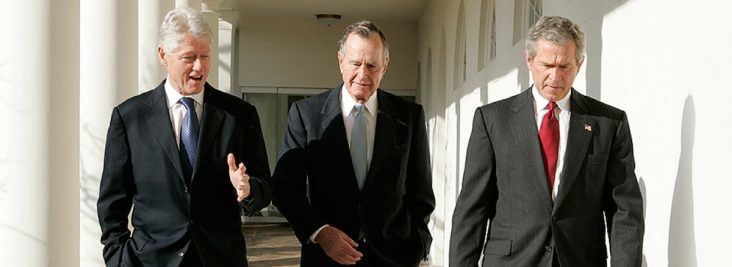Former Presidents Clinton and Bush, former British Prime Minister Blair talk leadership with Presidential Scholars grads
by July 14, 2016 8:58 pm 337 views

Great Britain can still change its mind about leaving the European Union, former British Prime Minister Tony Blair said Thursday (July 14) in a panel discussion with former Presidents Bill Clinton and George W. Bush in Little Rock.
Blair said half of Britain’s exports are to the European market, but now the debate has changed. Instead of making theoretical claims and counter-claims, the British people can have a real debate over known facts as the country continues to exit the EU. He expressed hope that, ultimately, his country will remain in the EU.
“As the negotiations progress and we see what we’re actually going to be faced with, then I think we’re a sovereign people that’s also entitled to reconsider our position,” he said.
The three world leaders were participating in graduation ceremonies for the Presidential Leadership Scholars (PLS) program. Sixty-one leaders in various fields from across the country, including two from Arkansas, participated in the six-month leadership program, which began with an opening week session and included one extended weekend per month for five months for a total of 120 hours of instruction. This is the second year for the program. The ceremony was held at Central High School.
The program is organized with the participation of the Clinton Presidential Center, the George W. Bush Presidential Center, the George Bush Presidential Library Foundation, and the Lyndon Baines Johnson Foundation. Participants are given insights into how the presidents addressed various challenges.
The panel discussion was moderated by Alexis Herman, secretary of Labor under Clinton. When she asked about the reason Clinton participated in such efforts, he said, “Trying to change things for the better is what I call a positive addiction.” Bush said that while the world is continually changing, the need for leadership remains constant.
“These libraries can become really stale quickly. … This is a way for the four libraries in this part of the world to maintain a program that will have lasting effects,” Bush said.
Blair said this was his first trip to Arkansas, and the “baking heat” had made him feel affectionate toward the British weather. He said leaders must produce radical solutions that are also practical. Blair, who will speak Friday at the Clinton Presidential Center, said the two presidents had shown leadership abilities at moments that tested them and when they put the country’s and the world’s needs above everything else. He cited the American engagement in Kosovo under Clinton, and Bush’s response in the aftermath of the September 11 attacks.
Blair recalled the first time he had met both presidents. He first met Clinton when Blair was still leader of the opposition Labor Party and before Clinton’s re-election campaign. In the Oval Office, a reporter asked Clinton if he were sitting next to the next British prime minister – a politically dicey situation. Clinton met the moment by saying, “I just hope he’s sitting alongside the next president of the United States.” Blair first met Bush at Camp David. The two were from different political traditions – Bush a conservative Republican, Blair a liberal Labor Party member. When a reporter asked them what they shared in common, Bush disarmed the situation by saying, “Well, we share the same toothpaste.”
During the discussion, Clinton said the uncertainties of a changing world are affecting the psyches of people everywhere, driving the debate about issues and leading to anger and resentment that world leaders must combat.
Herman asked the three what could be done about the lack of faith in institutions. Clinton responded by saying that certain changes do cause legitimate angst, including growing worldwide inequality. Bush said the institution of the presidency is more important than the occupant, adding that the institution itself protects against the occupant’s weaknesses.
The three were asked how they dealt with disappointments. Bush said a leader must recognize the disappointment and deal with it without self-pity, because otherwise others won’t follow. He pointed to his own efforts to reform Social Security, which failed when members of his own party in Congress buckled.
“I think it’s really important in life to forgive. If you bear a grudge, then you can’t be a leader,” he said.
Blair said leaders must treat failure as a learning opportunity, and they must decide whether to give up on a particular issue or redouble the efforts. He cited his own efforts in encouraging peace in Northern Ireland. He later said, “If you want to be a leader in any walk of life, make it about a mission and not about a position.”
Clinton said leaders must be “other-directed in the face of disappointments.” When he and the first lady, Hillary Clinton, failed to enact health care reform in 1994, they made a list of every problem in health care and tried to check them off one by one. With the Mideast peace process, he finally had to just give up and wish everyone well.
Herman asked the leaders what it would take to heal the world community’s confidence. Bush responded by saying, “Knowing God is good all the time.” Clinton said people need to know their leaders care about them and that resentment and anger are not a good basis for decision-making. He pointed out that former South African President Nelson Mandela appointed to the government people who had imprisoned him.
“The discipline of gratitude is maybe the most important discipline any of us could ever develop,” he said.
This year’s participants included two Arkansans: John Forrest Ales, director of corporate communications for Walmart, and Kendra Johnson, state director of the Human Rights Campaign. Former Arkansas Speaker of the House Davy Carter participated in last year’s program.
Prior to the three leaders’ address, scholars participated in a discussion with three of the classmates who integrated Little Rock Central High School in 1957, Ernest Green, Minnijean Brown-Trickey, and Carlotta Walls LaNier.
